Hyatt: Gallagher Bassett Stiffs Provider With "Denial Dump" EOR

Why provide one baseless, nonsensical reason for refusing to pay a provider when you can provide 10?
That’s the approach Gallagher Bassett took when it improperly denied reimbursement to a California provider for treating an injured Hyatt employee. Most importantly, Gallagher Bassett authorized the treatment.
The Explanation of Review (EOR) Gallagher sent in response to the provider’s bill featured 10 seemingly random denial rationales, all invalid. Gallagher’s strategy seems to be to overwhelm the provider with every denial reason in the book to avoid paying.
This is the sewage through which California doctors must wade daily as they struggle to receive payment for authorized care they provide to injured workers.
See the Gallagher Bassett EOR below, and marvel at the fact that any doctor is still willing to treat Hyatt's injured workers in California.
Gallagher Bassett Refuses to Pay Because…Who Knows?
Per the Gallagher Bassett authorization, the provider conducted a standard Evaluation and Management (E/M) visit and billed Gallagher Bassett for the common E/M code 99215 and California-specific code WC002 for the required PR-2 report. The Gallagher Bassett authorization (below) specifically instructs the provider to bill 99215 for follow-up visits.
As the EOR (below) shows, Gallagher Bassett paid the provider $0.00 for the treatment it authorized.
In theory, a payer that refuses to pay must provide a valid reason. Instead, Gallagher Bassett sent the EOR below featuring 10 Claim Adjustment Reason Codes (CARCs) and Remittance Advice Remark Codes (RARCs), precisely none of which are valid.
The table below lists Gallagher Bassett's EOR false and repetitive “reasons” for denying payment for authorized treatment.
Denial Code |
Denial Description |
Why Denial Reason is False, Repetitive, or Nonsense |
252 |
An attachment/other documentation is required to adjudicate this claim/service. |
False: The provider sent the required PR-2 documentation with the bill |
G1 |
The charge exceeds the Official Medical Fee Schedule allowance. The charge has been adjusted to the scheduled allowance. |
False: Gallagher Bassett did not adjust the charge to the fee schedule amount |
G1 |
The charge exceeds the Official Medical Fee Schedule allowance. The charge has been adjusted to the scheduled allowance. |
Repeat False: Gallagher Bassett did not adjust the charge to the fee schedule amount |
G60 |
Payment for this service has been denied because it appears to be unrelated to the claimed work illness or injury. |
False: The authorized E/M visit is “related” to the injury |
P12 |
Workers’ compensation jurisdictional fee schedule adjustment. |
Repeat False: Gallagher Bassett did not adjust the charge to the fee schedule amount |
P2 |
A dispensing fee is not applicable for over-the-counter medication or medication administered at the time of a visit. |
False: There is no dispensing fee on the bill, and no medication was dispensed |
00663 |
Reimbursement has been calculated based on the state guidelines |
Repeat False: Sigh…Gallagher Bassett did not adjust the charge to the fee schedule amount |
252 |
An attachment/other documentation is required to adjudicate this claim/service. |
Repeat False: The provider sent the required PR-2 documentation with the bill |
309 |
The charge for this procedure exceeds the fee schedule allowance. |
Nonsense: Yes, and…? |
90812 |
The charge exceeds the Official Medical Fee Schedule allowance. The charge has been adjusted to the scheduled allowance. |
Seriously? |
Did an untrained intern or ChatGPT decide on these denial reasons, or is Gallagher Bassett simply hoping that dumping a large quantity of denial reasons on an EOR will compensate for an obvious lack of quality reasons as it skirts paying for authorized treatment?
Imagine claims administrators adopting this method more widely, drowning California providers in specious denial reasons over dozens, hundreds, thousands, or millions of bills. How would providers keep up?
Sadly, the answer for many providers is to walk away from the system.
Bill faster, more smoothly, and with minimal headaches. Click below to see daisyBill makes workers’ comp easy:
BILL BETTER
DaisyBill provides content as an insightful service to its readers and clients. It does not offer legal advice and cannot guarantee the accuracy or suitability of its content for a particular purpose.







I truly enjoyed reading this article. I definitely will reference it in my classes.